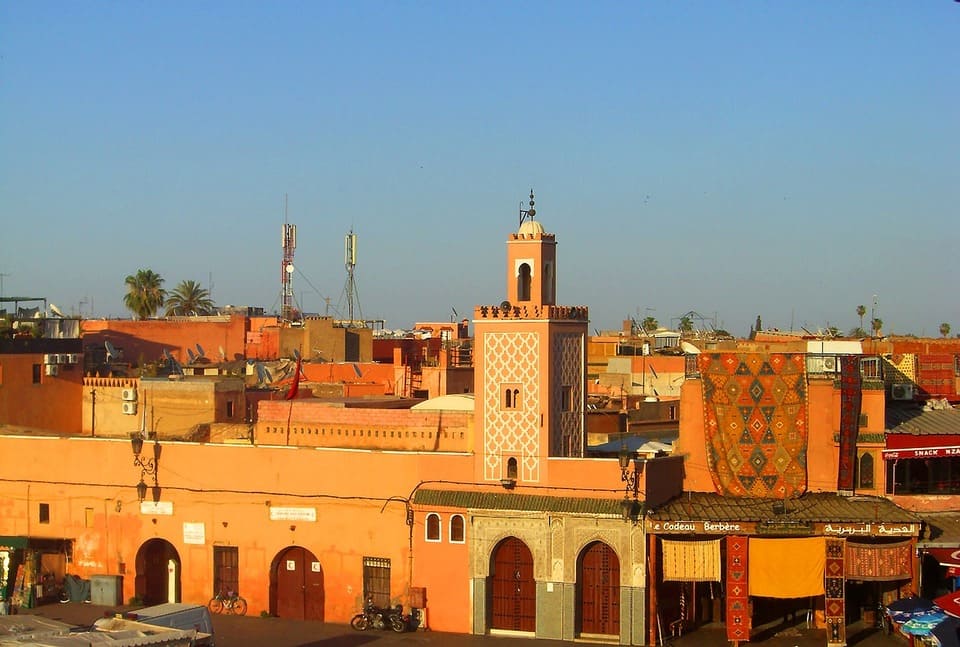
Moroccan Lexicon: Translating the Rich Mosaic of Local Languages
Unlocking the vibrant tapestry of Morocco's languages, both official and native, is a journey that reveals the nation's rich history, cultural diversity, and unique linguistic blend. From the formal elegance of Modern Standard Arabic to the indigenous beauty of Amazigh dialects like Tamazight and Tashelhit, Morocco's linguistic mosaic reflects centuries of influences from Africa, Europe, and beyond.
In this article, we'll delve into Morocco's official and native languages, and explore how PoliLingua serves as the one-stop solution for translating the diverse linguistic flavors of Morocco into a global language tapestry that fosters understanding, connection, and opportunity.
Official Languages of Morocco
Morocco, situated at the crossroads of Africa and Europe, is a nation with a rich linguistic tapestry. Its linguistic diversity is a testament to its complex history, cultural heritage, and the influence of various civilizations that have shaped the country over the centuries. Here are introduced the native and official languages of Morocco, shedding light on the unique linguistic landscape that defines this North African nation.
-
Arabic - The Language of Officialdom
Arabic is the official language of Morocco, used in government, administration, education, and media. However, it's important to distinguish between Modern Standard Arabic (MSA) and Moroccan Arabic, also known as Darija. MSA is the formal Arabic used in official documents and formal communications. Darija, on the other hand, is the spoken Arabic dialect used in everyday conversation by the Moroccan people. Darija incorporates elements from other languages, making it unique to Morocco. It's a vibrant and evolving language that reflects the nation's history and culture.
-
2. Amazigh - A Revival of Indigenous Culture
Amazigh, often referred to as Berber, is another official language of Morocco. This language is native to Morocco's indigenous Amazigh population, who have inhabited the region for millennia. There are several different Amazigh dialects spoken in Morocco, including Tamazight, Tashelhit, and Tarifit, each associated with specific regions and communities.
In recent years, there has been a concerted effort by the Moroccan government to promote and preserve the Amazigh languages. Amazigh has been taught in schools, and there is a growing recognition of its cultural significance. Road signs and official documents are now often bilingual, featuring both Arabic and Amazigh.
Native Languages of Morocco
-
Moroccan Arabic (Darija) - The Language of the People
While Darija is technically a dialect of Arabic, it is distinct enough to be considered a native language of Morocco. Darija is the language spoken in the streets, markets, and homes of Moroccans. It's a dynamic language that has evolved over centuries, influenced by the various civilizations that have passed through Morocco, including Arab, Berber, and European influences.
Darija is characterized by its use of colloquial expressions, idioms, and borrowed words from French and Spanish. It can vary significantly from one region to another, making it a fascinating linguistic mosaic within Morocco itself. While Arabic is the language of officialdom, Darija is the language of the heart for most Moroccans.
-
Amazigh (Berber) Languages - Echoes of Ancient Heritage
The Amazigh languages, as mentioned earlier, are indigenous to Morocco. They are spoken by the Amazigh people, who have a rich history dating back thousands of years. The Amazigh languages, like Tamazight, Tashelhit, and Tarifit, are not only a means of communication but also a repository of cultural knowledge, myths, and traditions. Each dialect is associated with different Amazigh communities across Morocco:
- Tamazight - Spoken predominantly in the Middle Atlas, High Atlas, and Souss regions.
- Tashelhit - Commonly spoken in the Anti-Atlas and Souss regions.
- Tarifit - Prevalent in the Rif region of northern Morocco.
These languages have faced challenges over the years due to historical marginalization, but recent efforts to promote them have helped revitalize Amazigh culture and heritage.
-
Spanish Language Influence in Northern Morocco
In the northern regions of Morocco, particularly cities like Tangier and Tetouan, Spanish is widely spoken and understood. This linguistic influence is a direct result of Spain's historical presence in this part of Morocco. Due to proximity and cultural exchange, many Moroccans in these areas are bilingual, speaking both Arabic and Spanish. Spanish-language education and media also contribute to the prevalence of Spanish in this region.
-
French as a Second Moroccan Language
French has a significant presence in Morocco, especially in urban areas and among the educated elite. It serves as a second language for many Moroccans, and its importance extends to business, government, and education. French-language schools and universities are common, and proficiency in French is often seen as an asset in the job market. French influence in Morocco is a legacy of the colonial period when Morocco was a French and Spanish protectorate.
-
English on the Rise
In recent years, English has been gaining popularity in Morocco, particularly among the younger generation. English-language education has become more widespread, and many Moroccans are eager to learn English for business, tourism, and international communication purposes. You can find English-language signage and services in major tourist areas and cities.
-
Hassaniya Arabic in the South
In the southern regions of Morocco, especially in the Sahara Desert and areas bordering Mauritania, Hassaniya Arabic is spoken. This dialect has been influenced by the nomadic lifestyle of the Sahrawi people and shares similarities with Arabic dialects spoken in neighboring Mauritania and Western Sahara.
-
Jewish Languages
Morocco has a history of Jewish communities, and as a result, there are unique Jewish languages spoken in the country. Judeo-Moroccan Arabic and Haketia (a Judeo-Spanish language) were used by Moroccan Jews. Although the Jewish population has significantly declined in Morocco over the years, these languages still hold cultural significance and historical value.
Linguistic Diversity and National Identity
The linguistic diversity of Morocco is a reflection of its rich history and multicultural identity. This diversity, while at times complex, is a source of pride for Moroccans. It's a testament to the country's ability to absorb and integrate diverse influences into its cultural fabric. The Moroccan government has taken steps to recognize and preserve indigenous languages like Amazigh, acknowledging their role in shaping the nation's identity.
In 2011, following the Arab Spring protests and demands for greater cultural and linguistic recognition, Morocco revised its constitution, explicitly acknowledging Amazigh as an official language alongside Arabic. This was a significant step toward recognizing the country's linguistic diversity and promoting cultural pluralism.
Translate Moroccan Languages in One Place
PoliLingua offers a range of professional translation services, including document translation, website localization, and multimedia translation. This enables businesses and organizations in Morocco to communicate effectively with diverse audiences in multiple languages.
Understanding the cultural nuances of each language is crucial for accurate communication. Our team of expert translators ensures that translations are culturally sensitive and contextually appropriate, taking into account the unique cultural norms and customs of Morocco.
Here's how PoliLingua contributes to Morocco's cultural and economic landscape.
-
Translation Services for Arabic and Darija
PoliLingua offers precise translations between Arabic and other languages, ensuring that businesses can effectively communicate with Moroccan audiences. Whether it's translating legal documents, marketing materials, or websites, PoliLingua's expertise in Arabic is invaluable.
-
Amazigh (Berber) Translations
Recognizing the significance of Amazigh languages in Morocco, PoliLingua provides translation services for Tamazight, Tashelhit, and Tarifit. This enables businesses to engage with Amazigh-speaking communities and promote cultural inclusivity.
-
French and Spanish Translations
PoliLingua facilitates cross-cultural business relationships by translating content between French, Spanish, and Arabic. This is essential for companies operating in northern Morocco or dealing with Spanish-speaking clients.
-
English Localization
As English becomes more prevalent in Morocco, PoliLingua assists businesses with English translation and localization to reach wider audiences and tap into global markets.
-
Multilingual Website Localization
For businesses looking to expand their online presence in Morocco, PoliLingua offers website localization services. This includes translating and adapting websites to suit the linguistic and cultural preferences of different regions within Morocco.
-
Legal and Official Document Translation
For legal and official document translations, accuracy is paramount. PoliLingua's official translators ensure that legal documents are translated accurately and in compliance with legal standards, making them suitable for official use.
-
Certified Translations
With certified translation PoliLingua ensures the accuracy and legality of translations, making them suitable for official purposes, such as legal documents, contracts, and immigration requirements.
Advantages of PoliLingua in Translations of Languages of Morocco
- Cultural Sensitivity: PoliLingua's translators understand the cultural nuances of Morocco's diverse communities, ensuring that translations are contextually appropriate and respectful of local customs.
- Efficiency: In a rapidly changing global landscape, PoliLingua's efficient translation services help businesses adapt and respond to market demands in Morocco.
- Global Reach: For Moroccan businesses looking to expand internationally, PoliLingua provides a gateway to global markets, offering translations in multiple languages.
- Cost-Effective Solutions: PoliLingua's cost-effective pricing models make professional translation services accessible to a wide range of clients, from startups to large enterprises.
- Quality Assurance: With a team of highly skilled linguists and a commitment to quality, PoliLingua ensures that translations are accurate and reliable.
In Morocco, where languages intermingle to form a linguistic tapestry, effective communication is the key to unlocking the country's vast cultural and economic potential. PoliLingua, with its expertise in Arabic, Amazigh, French, Spanish, English, and more, serves as an invaluable partner in bridging linguistic divides.
As Morocco continues to thrive as a dynamic cultural and economic hub, language translation services like PoliLingua play a pivotal role in connecting businesses, organizations, and individuals with the diverse communities that call Morocco home. PoliLingua helps create a more inclusive and interconnected Morocco where ideas, cultures, and opportunities flow freely by breaking down language barriers.







